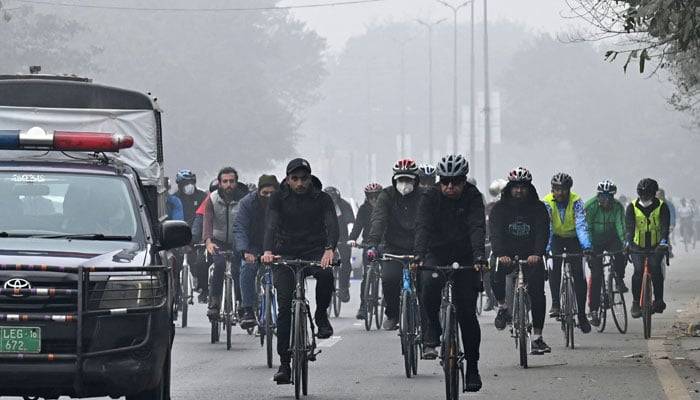
Cyclists in smog-smothered Lahore are enduring hazardous pollution levels, abuse from drivers, and social stigma in a campaign to get people to ditch their cars.
Each week, around a hundred cyclists including adults and children - some wearing masks or scarves wrapped around their mouths and noses - jump on their bikes to cycle around landmarks in a city home to more than 11 million people.
"The smog is a huge concern for us because there are so many cars now and the population has increased so much," said Afia Khan, who joined the cycling initiative in August.
It is an uphill challenge encouraging people to take up the environmentally friendly mode of transport, and the group often require a police escort to keep them safe in a city which still lacks dedicated bicycle lanes.
Cyclists are "at the mercy of these ruthless motorbikes, chingchies (auto-rickshaws) and cars" that have not embraced the idea of sharing the roads with cyclists, said Rana Sohail, the head of Clean Pakistan Green Pakistan, which launched the venture with Critical Mass Lahore.
"The government needs to create a more cycling-friendly infrastructure," participant Humayun Qureshi said.
There is also a pervasive attitude in deeply conservative Pakistan that sport, including cycling, is inappropriate for women, who are at constant risk of harassment from men.
"Going biking alone as a woman can be difficult because of the harassment you're going to face," Zarwa Jamal, a student who was cycling with her whole family. "It's truly great to be able to go with the group because I'm ensured of my safety."
Lahore consistently ranks as one of the world's most polluted large cities, with industrial pollutants, smoke from seasonal crop burn-off, fumes from vehicles and colder winter temperatures coalescing into toxic smog.
Each week, around a hundred cyclists including adults and children - some wearing masks or scarves wrapped around their mouths and noses - jump on their bikes to cycle around landmarks in a city home to more than 11 million people.
"The smog is a huge concern for us because there are so many cars now and the population has increased so much," said Afia Khan, who joined the cycling initiative in August.
It is an uphill challenge encouraging people to take up the environmentally friendly mode of transport, and the group often require a police escort to keep them safe in a city which still lacks dedicated bicycle lanes.
Cyclists are "at the mercy of these ruthless motorbikes, chingchies (auto-rickshaws) and cars" that have not embraced the idea of sharing the roads with cyclists, said Rana Sohail, the head of Clean Pakistan Green Pakistan, which launched the venture with Critical Mass Lahore.
"The government needs to create a more cycling-friendly infrastructure," participant Humayun Qureshi said.
There is also a pervasive attitude in deeply conservative Pakistan that sport, including cycling, is inappropriate for women, who are at constant risk of harassment from men.
"Going biking alone as a woman can be difficult because of the harassment you're going to face," Zarwa Jamal, a student who was cycling with her whole family. "It's truly great to be able to go with the group because I'm ensured of my safety."
Lahore consistently ranks as one of the world's most polluted large cities, with industrial pollutants, smoke from seasonal crop burn-off, fumes from vehicles and colder winter temperatures coalescing into toxic smog.

